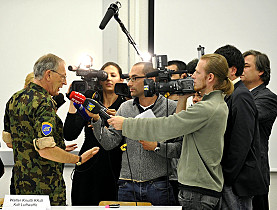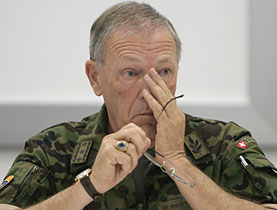Few regret departure of air force commander

The resignation of Walter Knutti as commander of Switzerland's air force has been largely welcomed by politicians and the press.
His removal came eight days after a rafting accident killed four soldiers. A fifth man is still missing, presumed dead. Another five were injured.
Knutti was asked to step down by Swiss armed forces commander Roland Nef on Thursday.
Nef told a media conference the following day that although the request for his resignation was not directly linked to the accident on the River Kander in canton Bern on June 12, investigations into that case had revealed previous misjudgements by the 60-year-old commander.
“I want order in the army. Where there is no order, I will enforce it, ” Nef said. “I lead and I act, and I expect the same of my subordinates.”
Support for Nef
Comment columns in Saturday’s papers show broad support for Nef.
The Tages-Anzeiger of Zurich welcomed the fact that the army was not fobbing off responsibility onto subordinates. “Up until now such clear speaking has been unusual in an army which preferred to draw a veil over shortcomings, rather than to publicise them,” it remarked.
But it said Nef alone could not restore confidence in the army: an external investigation by civilians is needed to see what else is wrong with the army.
The Tribune de Genève also concluded on the need for an outside investigation; it feared that otherwise Knutti would simply be a scapegoat whose departure made no real difference.
The Berner Zeitung said that the army was under political pressure nowadays, and praised Nef for giving a “stong and proper signal” to help restore its credibility.
Nef’s move was fully supported by Defence Minister Samuel Schmid, said Schmid’s spokesman, Jean-Blaise Defago.
The centre-left Social Democratic Party welcomed Knutti’s resignation, but reiterated a longstanding call for a review into the practices within the armed forces. Both the Swiss Officers Association and the centre-right Christian Democratic Party welcomed the resignation.
However, the rightwing Swiss People’s Party said the wrong man had gone. Spokesman Alain Hauert suggested that Schmid himself ought to take responsibility.
Failings
At his media conference, Nef acknowledged Knutti’s service and his loyalty, but said the commander’s previous misjudgements meant that he could not have entire confidence in him.
Knutti had forwarded promotion applications for officers without reviewing the files of the applicants, he said.
Two weeks prior to the fatal rafting expedition Knutti rubber-stamped a promotion of the officer who would organise the trip, although the officer had not reached the minimum age of 30 years.
An investigation into Knutti’s records following the accident revealed two more similar cases.
A statement released by the defence ministry on Friday said that Markus Gygax, Knutti’s former deputy, is replacing him until his permanent successor is announced.
Investigation
A defence ministry spokeswoman told Swiss radio on Friday that the accident was now being investigated by military prosecutors.
The rafting trip, designed to strengthen morale, had not been included in the company’s daily or weekly agenda, she revealed.
The unnamed officer who organised the trip survived the accident with a broken jaw and is now the subject of a preliminary inquiry that could be expanded to others, she said.
The search for the man who is still missing is continuing over the weekend in the area where the Kander flows into Lake Thun.
The last time a senior commander in the Swiss military resigned was in 1992, when Walter Jung stepped down following a near-collision between a Swissair jet and an air force Tiger fighter.
swissinfo with agencies
July 12, 2007: six recruits die in an avalanche on the Jungfrau in the Bernese Oberland, the worst accident in 15 years for the armed forces.
October 12, 2001: an Alouette III helicopter hits a cable near Crans-Montana in canton Valais and crashes, killing all four people on board.
May 25, 2001: an Alouette III helicopter hits a cable near Delémont in canton Jura, killing the pilot and three border guards.
November 12, 1997: a Pilatus Turbo-Porter aircraft crashes during an exercise near Simmental in canton Bern. The pilot and four passengers die.
June 22, 1994: a civilian helicopter collides with a Swiss army Super Puma helicopter and crashes. A British couple and the pilot are killed.
April 27,1993: an army Pilatus Porter is caught up in high winds and flies into a cliff on the Finsteraarhorn in canton Bern. Three people die.
November 2, 1992: six people die when a munitions depot blows up near Susten in canton Bern.

In compliance with the JTI standards
More: SWI swissinfo.ch certified by the Journalism Trust Initiative

You can find an overview of ongoing debates with our journalists here. Please join us!
If you want to start a conversation about a topic raised in this article or want to report factual errors, email us at english@swissinfo.ch.